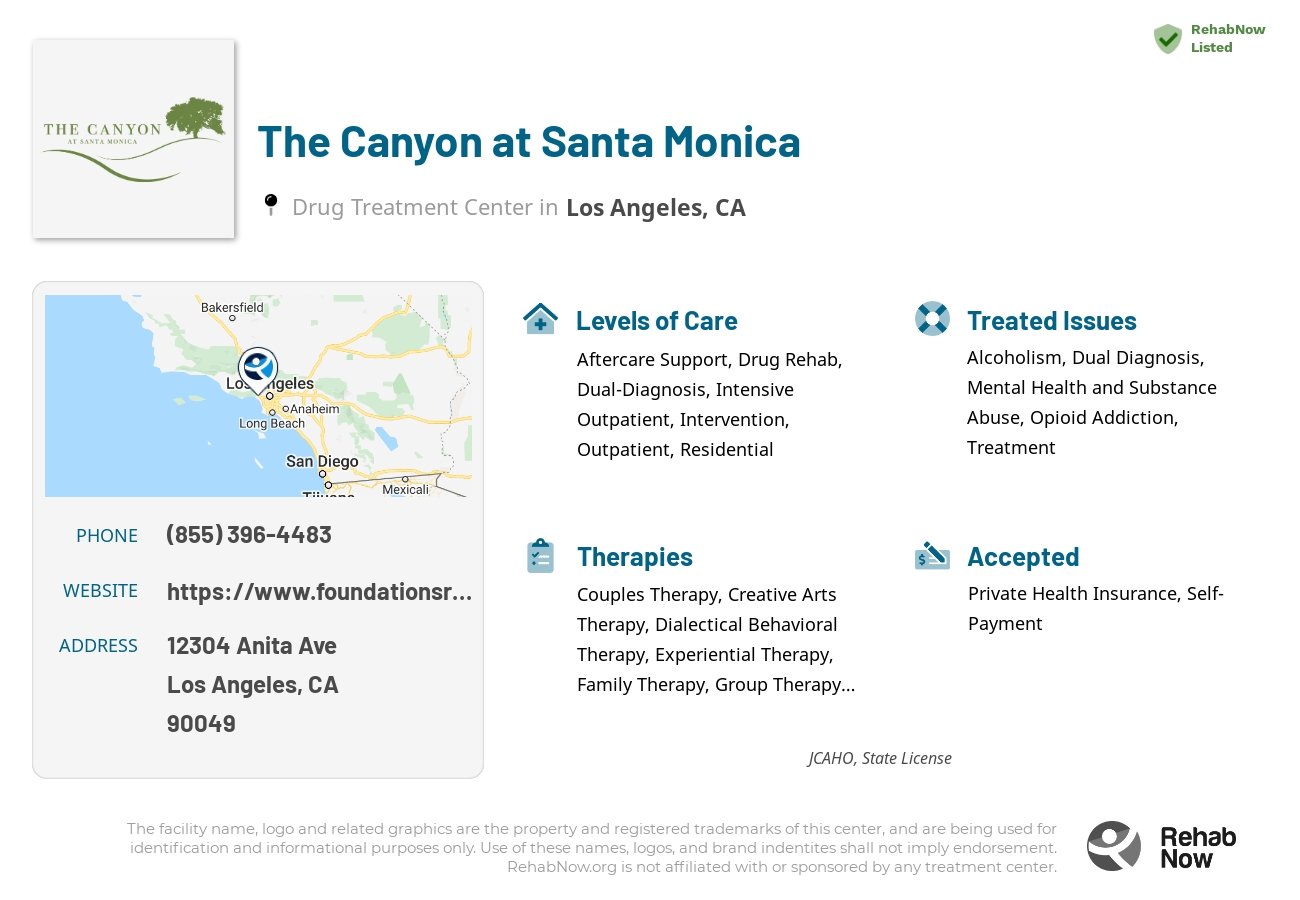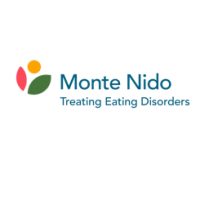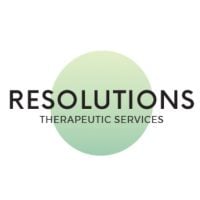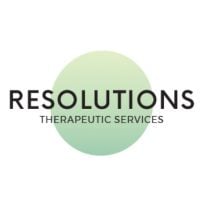About This Los Angeles, CA Facility
The Canyon at Santa Monica, nestled in the heart of West Los Angeles, California, specializes in providing adults aged 18 and older with comprehensive solutions for alcohol and drug rehab. This facility is known for its unique approach, combining partial hospitalization programs (PHPs) and intensive outpatient programs (IOPs) with a backdrop of ocean views and city accessibility. It stands out for its dual-diagnosis care, medication-assisted treatment, and specialized programs tailored for professionals.
- Medication-Assisted Treatment (MAT) for Opioid Use: Utilizes FDA-approved medication to curb cravings and minimize relapse risks.
- Specialized Program for Professionals: Designed to meet the unique recovery needs of working professionals.
- Comprehensive Aftercare Services: Includes ongoing counseling, support groups, and an alumni program to promote long-term sobriety.
Accredited by LegitScript, JCAHO, and holding a State License, The Canyon at Santa Monica ensures the highest quality of care. The facility's broad insurance acceptance, including major providers like United Healthcare and Blue Cross Blue Shield, demonstrates its commitment to accessibility and client support through various recovery journeys.
Focusing on a wide array of addictions—including alcoholism, opioid addiction, and drug addiction—The Canyon employs evidence-based therapies like Cognitive Behavioral Therapy (CBT) and Acceptance and Commitment Therapy (ACT). Treatment levels range from intensive outpatient programs to full-day partial hospitalization, covering every need from initial recovery to long-term sobriety maintenance.
Genders
Ages
Modality
Additional
Accreditations
State License

LegitScript

JCAHO
Conditions and Issues Treated
Substance abuse refers to the intensive and inappropriate use of psychoactive substances. Psychoactive substances are those that affect brain function. These include illegal drugs, alcohol, and even the excessive use of prescription drugs. The overuse of psychoactive substances leads to severe physical or psychological dependence. It also affects the social life and relationships of the affected individual. Substance abuse is treatable.
The duration of treatment at The Canyon at Santa Monica in Los Angeles can require weeks or even months depending on the severity of the condition as there is a risk of relapse. Treatment options include medications, counseling sessions, various types of behavioral therapy, and group therapy in different combinations.
Addiction to prescription opioid painkillers like oxycodone and hydrocodone, and illicit opioids such as heroin, leads to potentially life-threatening withdrawal symptoms when discontinued. Opioid addiction treatment typically involves an inpatient stay at facilities like The Canyon at Santa Monica to make sure they get through withdrawal safely. Treatment also includes comprehensive mental health counseling.
Mental illness includes conditions such as anxiety, depression, schizophrenia, bipolar disorder. It can also happen that mental illness causes drug addiction and vice versa. The Canyon at Santa Monica in California knows it is vital to diagnose dual diagnosis or co-occurring disorder.
Levels of Care Offered
This center offers a variety of custom treatment tailored to individual recovery. Currently available are Aftercare Support, Drug Rehab, Dual-Diagnosis, Intensive Outpatient, Intervention, Outpatient, Residential, with additional therapies available as listed below.
Daily trips to the hospital that provides the treatment include intensive outpatient services (IOP). IOP in California is appropriate for patients in residential recovery facilities that have been diagnosed with addiction. Patients return to their everyday lives gradually, increasing the likeliness of success in treatment.
To assist with alcohol or opioid abuse, or a co-occurring condition, The Canyon at Santa Monica offers an outpatient treatment program. For their rehabilitation and other services, the California patient will go to the treatment center, yet return home every night. After most of the program is completed, the level of mandatory participation reduces.
Residential treatment programs are those that offer housing and meals in addition to substance abuse treatment. Rehab facilities that offer residential treatment allow patients to focus solely on recovery, in an environment totally separate from their lives. Some rehab centers specialize in short-term residential treatment (a few days to a week or two), while others solely provide treatment on a long-term basis (several weeks to months). Some offer both, and tailor treatment to the patient’s individual requirements.
Treatment is just a first step in sustaining sobriety. After rehabilitation, counseling for aftercare helps the person adapt to a life without drugs. A sober living facility in Los Angeles, job therapy, or educational assistance may be included in this service, managed by The Canyon at Santa Monica. This is when a preventive strategy for relapse starts to take shape.
The Canyon at Santa Monica‘s Therapies & Programs
In addiction recovery at The Canyon at Santa Monica, therapy plays a significant role. This helps patients get to the root of their addiction and discover how the problems that contributed to their use can be handled better. Therapy can be performed in a group and one on one settings. The patient interacts with the therapist in a one-on-one atmosphere during individual therapy. This encourages them to reflect on the underlying addiction problems and develop ways to avoid potential future abuse.
Recovering from addiction involves recovering relationships as well. One of the most common areas of stress and damage during addiction is in intimate relationships. Couples therapy at The Canyon at Santa Monica can rebuild trust and joy that may have been damaged. Addiction involves everyone in the family, not only the addict.
Family roles can change in damaging ways that may require professional help to rebalance. Successful intimate relationships can decrease the chances for relapse by ensuring a healthy environment after rehab in Los Angeles, CA.
Addiction and alcoholism affect the entire family. For this reason, family therapy is vital to a person’s recovery from addiction. In contrast to couples counseling, family therapy at The Canyon at Santa Monica may include siblings, children, parents, and other significant people in the recovering person’s life. Family support is one of the most important pillars of recovery.
Many people turn to drugs and alcohol as a way of processing trauma that has affected them in the past. Trauma can include abuse, neglect, the loss of a loved one and other unpleasant incidents. Trauma therapy at The Canyon at Santa Monica helps patients process trauma. It gives them the tools to deal with it in a healthier manner.
Dialectical behavioral therapy (DBT) is a type of Cognitive Behavioral Therapy that focuses on eliminating specific negative thoughts such as suicidal thoughts that can potentially lead to an individual inflicting self-harm. It is useful in the treatment of patients exhibiting uncontrollable emotions, intense mood swings, and borderline personality disorders.
The term “Dialectic” means the integration of opposites. In the substance abuse context, DBT refers to accepting the patient’s addiction and working to change their thoughts and behavior. It improves life skills such as controlling the intense emotions without reacting impulsively, resolving the interpersonal conflicts effectively, and promoting awareness about self and others.
Cognitive Behavioral Therapy (CBT) examines the relationship between a patient’s thoughts, feelings and behaviors. The Canyon at Santa Monica aims to establish a healthy response to thoughts and feelings as an alternative to turning to drugs and alcohol. It also promotes healthy communication between addicts and those around them. It is and effective therapy for people suffering with all types of addictions.
EMDR therapy is combined with behavioral therapies to address the root cause of the problem. The rapid eye movements reduce the patients’ negative feelings related to the trauma and promote calmness and relaxation.
Life skills pertain to the skill sets a person should possess to become successful in life. Examples are time management, budgeting, and social abilities. Life skills therapy highlights the fact that addiction recovery is more than just a person’s ability to go through their day-to-day without resorting to substance use in Los Angeles, CA once they leave the facility.
The recovery technique used by Alcoholics Anonymous is the 12 step program, but it can relate to any form of addiction. The 12 steps that addicts must take on the road to recovery are explained. Measures include acknowledging that you have a problem and agreeing to turn around your life. The curriculum, instructed by The Canyon at Santa Monica, also requires a belief in a greater power and making amends to others.
It’s no surprise that diet is a crucial player in one’s well-being. What an individual puts into his or her body becomes the fuel that drives the mental and physical faculties to perform accordingly. Therefore, nutrition therapy, also known as medical nutrition therapy (MNT), guarantees that an individual is providing his or her mind and body with proper nourishment.
The right diet can improve a person’s general outlook, sleep habits, and thought processing skills. MNT also lowers the occurrence of chronic diseases such as adult-onset diabetes. Dieticians at The Canyon at Santa Monica in Los Angeles, California believe that nutrition therapy is the key to making significant lifestyle changes, especially when it comes to personal care.Nicotine Replacement Therapy (NRTC) used products like skin patches and gum to deliver nicotine into the bloodstream of people trying to quit smoking. This helps break the habits associated with smoking. The very low doses of nicotine managed by The Canyon at Santa Monica prevent cravings while helping people make a gradual transition to complete smoking cessation.
Patient Experience
Creative Arts
For those combating addiction recovery in Los Angeles, CA, creative arts therapy, or expressive therapy, is advantageous. Reading, music, theater, art, and other types of self-expression may be included. The Canyon at Santa Monica uses this to enhance the mental state of the patient and help them to focus on something other than addiction. It helps patients to explore how, through the creative process, their thoughts and emotions play out.
Experiential Therapy at The Canyon at Santa Monica
Experential therapy is a unique type of therapy that deals with the subconscious mind. This treatment available at The Canyon at Santa Monica in Los Angeles, CA encourages individuals to work out their issues with their inner self through synchronous experiences.
This non-traditional treatment method makes use of the physique and encourages people to take part in various physical and emotional activities, movements, and practices. Some of the most common examples of experiential therapy are equine therapy, music therapy, adventure therapy, and role playing. Through these various methods, an individual is believed to heal from trauma, negative emotions, and hurtful memories faster. Moreover, experiential therapy is known to have enduring results which can be beneficial to sufferers.
Payment Options Accepted
For specific insurance or payment methods please contact us.
Is your insurance accepted?
Ask an expert, call (888) 674-0062
Additional Details
Specifics, location, and helpful extra information.
Los Angeles, California 90049 Phone Number(855) 396-4483 Meta DetailsUpdated April 15, 2024
Staff Verified
Is The Canyon at Santa Monica a LegitScript Verified Treatment Facility?
According to our most recent records, we have found this center to be LegitScript verified.
Patient Reviews
There are no reviews yet. Be the first one to write one.
Los Angeles, California Addiction Information
More than 3 million of California's citizens are addicted to illegal drugs. Almost 800,000 people use hard drugs, almost 5 million use marijuana, and another 2.1 million abuse alcohol every year. Other substance abuse issues such as binge drinking and teen drug use are also common. Many illegal drugs such as cocaine, heroin, methamphetamine, and marijuana are smuggled into the state from Mexico.
10% of adults in Los Angeles have used illicit drugs or abused prescription drugs within the past year. Heroin, marijuana, prescription pain relievers and cocaine are widely abused in Los Angeles. Over 130,000 people in the city struggle with addiction to drugs or alcohol. Many residential rehab facilities in the area can provide long-term care. The best way to find the right treatment option is to speak with a professional.
Treatment in Nearby Cities
- Chula Vista, CA (126.9 mi.)
- Victorville, CA (75.7 mi.)
- Calabasas, CA (11.7 mi.)
- Lemon Grove, CA (123.5 mi.)
- Redlands, CA (74.5 mi.)
Centers near The Canyon at Santa Monica
The facility name, logo and brand are the property and registered trademarks of The Canyon at Santa Monica, and are being used for identification and informational purposes only. Use of these names, logos and brands shall not imply endorsement. RehabNow.org is not affiliated with or sponsored by The Canyon at Santa Monica.












